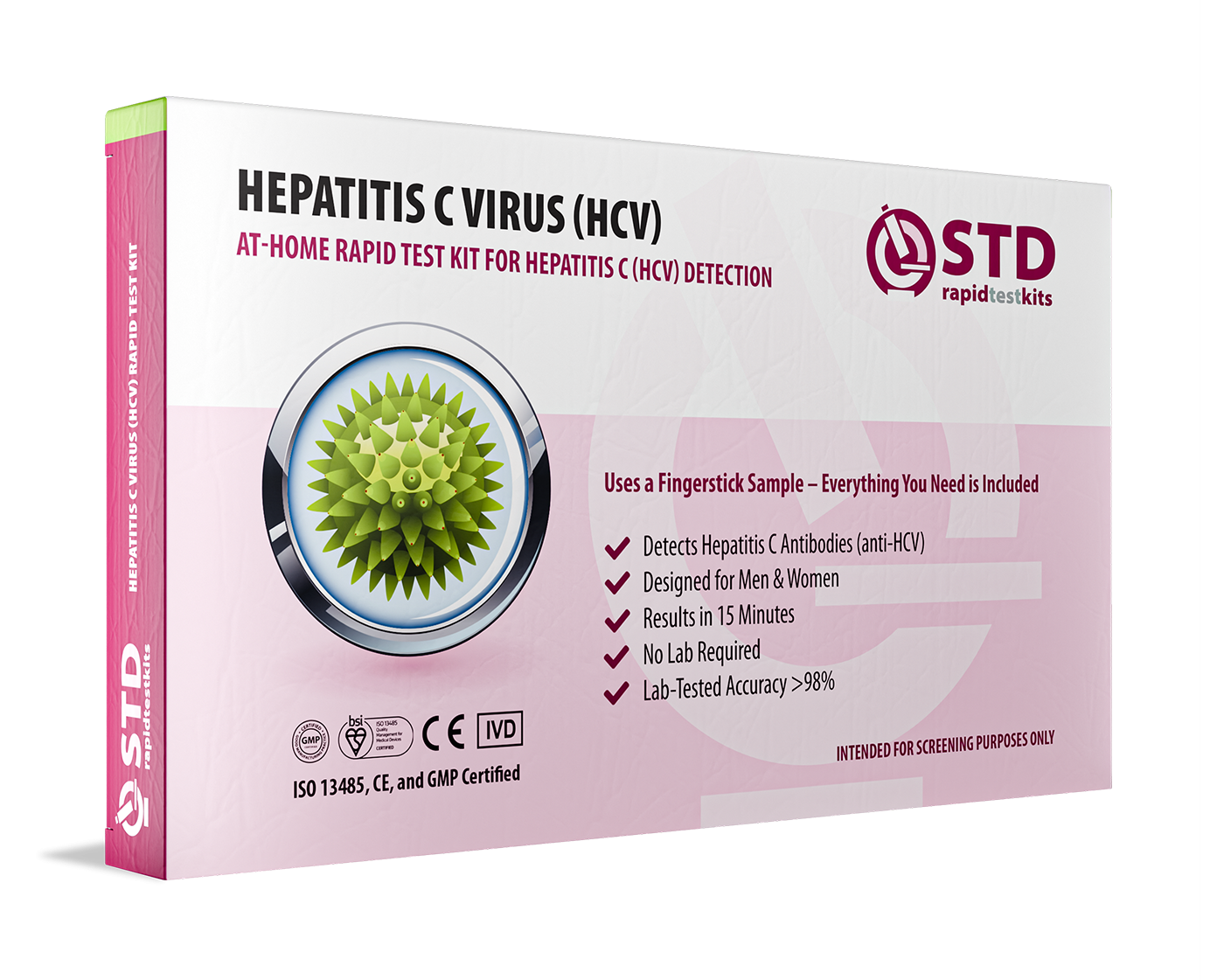UTI Symptoms That Turned Out to Be an STD
Quick Answer: What is Hepatitis C?
Hepatitis C is a blood-borne virus that infects the liver, often with no symptoms until it causes serious damage. It spreads most often through blood-to-blood contact, but it can be transmitted sexually, especially during high-risk acts. The good news? It’s curable in most people with modern antiviral treatment.
The Silent Virus: Why Hep C Stays Hidden for So Long
If hepatitis C had a Tinder bio, it might say “low-key, commitment issues, ghosting symptoms.” That’s because the virus often takes years, or decades, to show itself. You can look fine. Feel fine. Live fine. Until one day you don’t.
The early symptoms, if they appear at all, are vague:
- Fatigue that lingers no matter how much you rest
- Joint or muscle aches you chalk up to stress or aging
- Mild nausea or loss of appetite
- Occasionally, dark urine or yellowing of the skin or eyes (a sign of liver distress)
But most people never get those dramatic signs. Instead, the virus quietly inflames the liver, slowly scarring it over time. By the time symptoms scream instead of whisper, many people already have chronic hepatitis C or even cirrhosis.
People are also looking for: Can I get an STD from a tattoo needle?
Sex, Blood, and Other Truths: How Hepatitis C Is Spread
Let’s bust the biggest myth right now: Hepatitis C is not just a drug user’s disease. Yes, sharing needles is a major transmission route, but that’s not the whole picture.
Here’s how people really catch Hep C:
- Blood-to-blood contact (needles, razors, unsterile tattoo or piercing equipment)
- Unprotected sex, especially if rough, anal, or during menstruation
- Shared straws or equipment for snorting drugs
- Medical or dental procedures in countries with poor sterilization practices
- Birth from a Hep C-positive mother
- Prison environments, where hygiene and equipment access are limited
And yes, while Hepatitis C is less commonly transmitted through sex, it does happen, especially with multiple partners, STDs that cause lesions, or certain kink practices. If you’ve had any of those exposures, even years ago, you’re not dirty. You’re not broken. You’re just overdue for a test.
Order Now $49.00 $98.00 Check Your STD Status in Minutes
Test at Home with Remedium
Hepatitis B & Hepatitis C Test Kit




For all 2 tests
Is Hepatitis C an STD?
Technically, no. Emotionally and practically? Sometimes, yes.
Hepatitis C isn’t classified as a traditional sexually transmitted disease, but sexual transmission is very real. It’s more common in:
- Men who have sex with men (MSM), particularly those with HIV
- People with multiple partners
- Rough or anal sex, where microtears and blood are more likely
- Unprotected sex during menstruation
The CDC has officially recognized the risk of sexual transmission in high-risk scenarios, and testing is now recommended for people with certain sexual exposure patterns.
Modern Medicine, Old Virus: Treatment Options for Hepatitis C
Let’s get to the part no one tells you soon enough: Hepatitis C is curable, often in just 8 to 12 weeks. No injections. No lifetime of meds. Just a daily pill regimen that clears the virus in most people completely.
Thanks to direct-acting antivirals (DAAs), the cure rate is over 95%. These meds target the virus directly, stop it from reproducing, and allow your liver to heal. The earlier you treat, the better the outcomes. But even late-stage diagnoses can lead to full clearance and improved liver function.
Common treatments include:
- Epclusa
- Mavyret
- Harvoni
- Zepatier
These are prescription-only and often covered by insurance or subsidy programs, especially if you test positive. But you can’t start treatment until you’re diagnosed. Which brings us to the real barrier.
The Shame Spiral: Why Hep C Stigma Is So Dangerous
Many people with Hepatitis C never get tested because they’re scared of what the result “says” about them. That they were reckless. That someone might judge them. That they’ll be seen as a drug user, a slut, a criminal.
Let’s make something brutally clear: Viruses don’t give a damn about your moral choices.
You can get Hep C from:
- A high school tattoo
- One drunken hookup with someone who didn’t know they had it
- A shared razor at a college party
- A decades-old needle in a hospital abroad
The stigma is the disease now. It keeps people silent, ashamed, and untreated, while the virus spreads and livers suffer. That’s why confidential, at-home testing is a game changer.
People are also looking for: How do I know if I’m fully vaccinated?
Case File: “I Only Found Out After I Got Engaged”
Lena, 34, didn’t know she had Hepatitis C until she went for a routine STD panel with her new fiancé. She didn’t use IV drugs. She didn’t sleep around. But her test came back positive.
“I felt dirty. Like I’d failed a test I didn’t know I was taking,” she told us. “I spent a week Googling Hep C in secret before I could even tell my partner.”
Turns out, Lena got a stick-and-poke tattoo in her early twenties, no gloves, no clue. She started treatment a month later, cleared the virus in ten weeks, and now speaks openly about testing.
“I was more afraid of the shame than the virus,” she says.“That’s the part that almost killed me.”
Quick, Private, Done: At-Home Testing for Hepatitis C
You don’t have to go to a clinic. You don’t have to talk to a doctor. And you don’t have to let fear make the decision for you.
With a Hepatitis B + C Test Kit from STD Rapid Test Kits, you can:
- Order discreetly online
- Test at home with a small blood sample
- Get results within minutes
- Take control of your next steps, in private
For many people, this isn’t just medical, it’s emotional safety.
Check Your STD Status in Minutes
Test at Home with RemediumHepatitis C Test Kit

 For Men & Women
For Men & Women Results in Minutes
Results in Minutes No Lab Needed
No Lab Needed Private & Discreet
Private & DiscreetOrder Now $33.99 $49.00
Hep C by the Numbers: Stats That Speak Loud
Numbers don’t lie, and with Hepatitis C, the story they tell is a mix of good news and missed chances:
- 58 million people worldwide live with chronic Hepatitis C (WHO, 2024)
- 1.5 million new infections happen each year, many from unknowingly infected people
- In the U.S., nearly 40% of those with Hep C don’t know they have it
- Cure rates with modern antivirals exceed 95%
- Most infections occur in people aged 30 to 60, but rates in young adults are rising
And the biggest stat of all? Over 350,000 people die every year from Hep C-related liver complications, many preventable with early testing and treatment.
The Future of Hepatitis C: From Eradication to Vaccination?
We’re on the brink of making Hepatitis C the second virus (after smallpox) we might one day eliminate. The tools are already here: easy testing, short-course cures, and expanding public awareness.
Here’s what’s coming next:
- Micro-elimination campaigns in prisons, shelters, and drug treatment centers
- Universal Hep C screening now recommended in many countries
- Research into vaccine development, still elusive, but in progress
- Over-the-counter self-testing kits, which could transform access
If awareness keeps growing, the virus doesn’t stand a chance.
People are also looking for: Can you get accurate results from an at-home STD test?
Busting the Biggest Myths About Hepatitis C
Let’s clear up a few lingering lies:
Myth: Only drug users get Hep C
Truth: Many cases are from medical procedures, tattoos, or sexual contact.
Myth: You’d know if you had it
Truth: Most people with Hep C have no symptoms for decades.
Myth: It’s not curable
Truth: It’s very curable, over 95% of treated people clear the virus.
Myth: It’s always passed sexually
Truth: Sexual transmission happens, but it’s not the main route.
Myth: You don’t need to test unless you feel sick
Truth: By the time symptoms appear, your liver might already be in trouble.
FAQs
1. Can hepatitis C go away on its own?
In rare cases, yes, about 25% of people clear it naturally. But most develop chronic infection without treatment.
2. How long can you have hepatitis C without symptoms?
Years or even decades. Many people only find out through routine bloodwork.
3. Is hepatitis C deadly?
It can be, if left untreated, it may lead to cirrhosis, liver failure, or liver cancer.
4. Can you get hepatitis C from oral sex?
Very rarely, but it’s possible, especially if there are cuts, sores, or blood involved.
5. What does hepatitis C rash look like?
It can appear as red, flat patches, hives, or even eczema-like irritation, usually due to liver inflammation or treatment side effects.
6. Can you get hepatitis C from kissing?
No. Saliva doesn’t carry enough virus to transmit it.
7. Is hepatitis C part of standard STD panels?
Not always, ask your provider or opt for a specific Hepatitis B + C test if you're unsure.
8. How do you know if Hep C has affected your liver?
Blood tests, imaging, and sometimes liver biopsy can reveal liver damage.
9. Can I donate blood if I’ve had Hep C?
No, even if cured, you can’t donate blood due to long-term safety protocols.
10. Is there a vaccine for hepatitis C?
Not yet. Only Hepatitis A and B have vaccines.
Take Control Today
If you think you might have Hepatitis C, there’s one easy next step: test. No waiting rooms. No shame. Just a simple kit and a clear answer. ➜ Hepatitis B + C Test Kit
References
2. Hepatitis C Fact Sheet – WHO (transmission including perinatal, global burden, prevention)
3. Epidemiology of Acute Hepatitis C – PMC (rising incidence among reproductive-age women globally)
5. Hepatitis C in Pregnancy – Oxford Academic (perinatal transmission rates and maternal outcomes)










